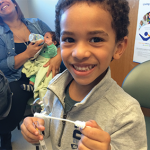The lesson was not lost on CARRA members. “As a community, we decided that every child with a rheumatic disease should have access to participation in a protocol, a registry, a clinical trial, or an observational study,” says Dr. Sandborg. “We believe that making research a standard of care would allow these children access to the best treatments.” Dr. Schanberg agrees, noting that in the APPLE trial, in which children with SLE were randomized to receive atorvastatin or placebo, all children also received standard care consisting of hydroxychloroquine and aspirin. “Some of the study sites were not routinely using hydroxychloroquine, and now they do. There are data that this is a best practice,” she says, adding that this demonstrates how study participation has the potential to improve patient care.
As is the case with pediatric cancer research, “the CARRA effort is strongly driven from the family side,” says Dr. Sandborg. “They go on the web, see the protocols, and seek out the best treatments. The vast majority of parents want to do something for their kids and those like them.” Even when enrollment in a trial may not directly help their own child, most parents continue to participate, hoping that the research may benefit other children with the same disorder. “Sometimes this is a hard sell,” says Dr. Sandborg, again citing APPLE. “APPLE is not a primary treatment trial—we’re trying to prevent a complication that might occur 10 or 20 years down the road. But enrollment rates for that trial were unusually high, which speaks to both to the relationships between physicians and patients, but also to partnerships among families on behalf of children.”


